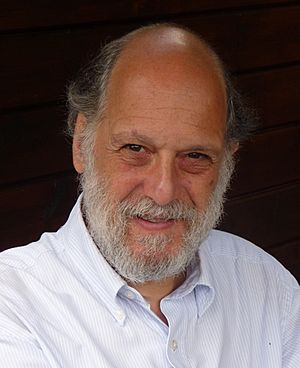Claudio Daniel Stern facts for kids
Quick facts for kids
Claudio Daniel Stern
FRS FRSB FMedSci
|
|
|---|---|
 |
|
| Born | February 9, 1954 Montevideo, Uruguay
|
| Scientific career | |
| Fields | Biology |
Claudio Daniel Stern is a British-Uruguayan biologist. He was born in Montevideo, Uruguay, on February 9, 1954. Today, he works as a professor at University College London (UCL).
Early Life and Learning
Claudio Stern started his schooling in Montevideo, Uruguay. He went to Escuela Evaristo Ciganda for primary school. For high school, he attended Liceo Suarez and Lycée Français. In 1971, he began studying Medicine.
A year later, in 1972, he moved to the United Kingdom. There, he studied Biological Sciences at the University of Sussex. He earned his first degree there. He then continued his studies at Sussex and completed his PhD in 1978. His PhD supervisor was Brian Goodwin. After finishing his PhD, he moved to University College London. He did more advanced research there with Ruth Bellairs, who was a famous expert in how embryos develop.
Claudio Stern's Career
After his research training, Professor Stern worked at the University of Cambridge. This was from 1984 to 1985. Then, he became a lecturer at the University of Oxford. He also became a College Fellow at Christ Church from 1985 to 1994.
In 1994, he moved to New York. He became the head of the Department of Genetics and Development at Columbia University. He returned to the UK in 2001. He became the "J Z Young" Professor at University College London. He also became the head of the Department of Anatomy and Developmental Biology there.
Professor Stern is involved in many important activities. Since 2012, he has been a member of the Scientific Council of Institut Pasteur in Paris. He was also the President of the International Society of Developmental Biologists (ISDB). He held this role from January 2010 to December 2013.
What He Studies
Professor Stern's research focuses on how living things develop. He studies the very early stages of development in animals with backbones. He wants to understand how different types of cells are formed. He also researches how these cells arrange themselves to create the body's patterns.
Awards and Recognitions
Professor Stern has received many important awards for his work. In 1993, he earned a Doctor of Science (DSc) degree from the University of Oxford. This degree was in Physiological Sciences.
He has been chosen as a member of several important groups:
- Fellow of the Royal Society of Biology (FRSB) in 2008.
- Academy of Medical Sciences (FMedSci) in 2001.
- The Royal Society (FRS) in 2008.
- EMBO in 2002.
- Academia Europaea in 2013.
- Latin-American Academy of Sciences (ACAL) in 2002 (as a Foreign Member).
- American Academy of Arts and Sciences (AAAS) (as a Foreign Honorary Member).
In 2006, he received the Waddington Medal. This award is from the British Society for Developmental Biology. In 2023, he was also chosen as a Foreign Member of the National Academy of Sciences of Uruguay (ANCIU). He has also given many important talks at science meetings around the world.
In 2017, he was awarded the Ross Harrison Prize. This prize is given by the International Society of Developmental Biologists.
 | Emma Amos |
 | Edward Mitchell Bannister |
 | Larry D. Alexander |
 | Ernie Barnes |

